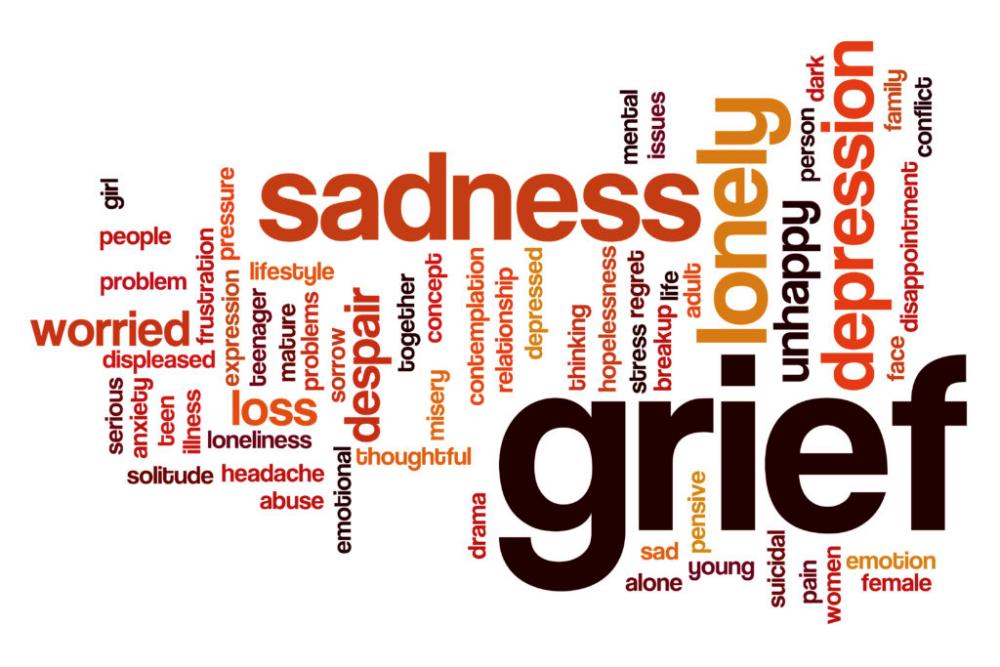GRIEF is a normal reaction to loss. It is the emotional pain you experience when something or someone you care about is taken away. Loss may be excruciatingly painful at times. You may feel a range of challenging and unexpected feelings, such as astonishment or fury, as well as disbelief, remorse, and great grief. Grief can also interfere with your physical health, making it difficult to sleep, eat, or even think clearly. These are typical emotions to loss, and the greater the loss, the more severe your grieving. Coping with the death of someone or something you care about is one of life’s most difficult problems.
Whatever your loss is, it is important to you, so do not be ashamed of how you feel, or think that it’s only normal to cry for specific things. It is totally acceptable to lament the death of a person, animal, relationship, or circumstance that meant a lot to you. Whatever the reason of your grieving, there are healthy strategies to cope with the suffering that, over time, may help you come to terms with your loss, find new purpose in your life, and gradually move on with your life.

Allow yourself to grieve
It is normal to cry. Many people find solace in sobbing. Emotional exploration and expression can be a component of the process. Listening to music or writing might be beneficial. Spending time alone might help you connect with your emotions. You can attempt to suppress your grief, but you will not be able to do so indefinitely. To heal, you must first accept your grief. Trying to escape pain and loss only serves to prolong the mourning process. Unresolved sorrow can also lead to sadness, anxiety, drug misuse, and health concerns.
Explore your grief
Accept and understand your sadness. Do not get away and just answer: “Everything is okay”, when people inquire how you are doing. Acknowledge that you are struggling. Look for a support group. Speak with a bereavement counsellor. Consider how you feel about what you have lost. And remember that losing something does not have to be the end of the world. Grief and loss allow you to see your life in a new light, which transforms how you see yourself in the world. Endings are also gateways to fresh experiences.

Talk to someone about it
When something significant occurs in our lives, especially a loss, we tend to want to talk about it. Sharing your thoughts and feelings with others, especially in the early stages of mourning, may be both clear and therapeutic, whether you are chatting with a friend, a partner, a co-worker, or a therapist. Talking about one’s sorrow can lead to a more thorough realisation that the loss has occurred, which can help a person better understand their feelings and experiences.
Preserve memories
Create a remembrance box or folder with mementos of the deceased. Include souvenirs, images, quotations, or anything else you choose. If you wish, you may write the individual a note. You might incorporate your sentiments and anything you wish to communicate in it. Some individuals send a letter of thanks. It is a method to express gratitude to a loved one for being a part of your life. If they instilled positive traits in you, continue to demonstrate such qualities in order to respect them. Love, appreciation, and significance may all help you get through a tough period.

Take care of yourself
It is more crucial than ever to take care of yourself while you are mourning. The stress of a significant loss may exhaust your energy and emotional reserves rapidly. Taking care of your physical and mental needs can assist you in getting through this tough period. It is also crucial to understand that feeling scared, having nightmares, or struggling to find the value of life is normal. If you are concerned about your sentiments, you may always consult a doctor.
Remember and celebrate the lives of your loved ones
The anniversaries of a loved one’s death can be traumatic for friends and family. It might cause deep pain, but it can also be a day for remembering and honouring them. You can opt to collect funds for the decease’s favourite charity, give a newborn a family name, or construct a garden in their honour. It is entirely up to you what you select, as long as it allows you to respect that special bond in a way that feels right to you.
Remember that grieving is natural; it is part of what it is to be human and to experience emotions. Grief has no short cuts; it takes time, often much more time than you and many others expect. It is natural to both mourn and live. Finally, it is important not to set unrealistic expectations for oneself and to recognise when to seek assistance. Grief is a huge event in anyone’s life, and there are no easy fixes.









